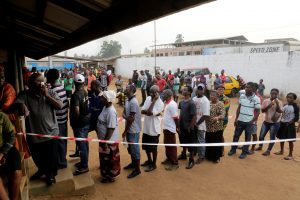
By Tom Perry
BEIRUT (Reuters) – The United Nations called on Tuesday for an immediate humanitarian ceasefire in Syria of at least a month as heavy air strikes were reported to have killed at least 40 people in rebel-held areas near Damascus and in the northwest.
Separately, U.N. war crimes experts said they were investigating multiple reports of bombs allegedly containing chlorine gas being used against civilians in the rebel-held towns of Saraqeb in the northwestern province of Idlib and Douma in the Eastern Ghouta suburbs of Damascus.
The Syrian government denies using chemical weapons.
The latest air strikes killed 35 people in the Eastern Ghouta suburbs after 30 died in bombardments of the same area on Monday, according to the Syrian Observatory for Human Rights. Air strikes in rebel-held Idlib killed six.
“Today there is no safe area at all. This is a key point people should know: there is no safe space,” Siraj Mahmoud, the head of the Civil Defence rescue service in opposition-held rural Damascus, told Reuters.
“Right now, we have people under rubble, the targeting is ongoing, warplanes on residential neighborhoods.”
Insurgent shelling of government-held Damascus killed three people, the Observatory and Syrian state media reported.
U.N. officials in Syria called for the cessation of hostilities to enable humanitarian aid deliveries, and the evacuation of the sick and wounded, listing seven areas of concern including northern Syria’s Kurdish-led Afrin region, being targeted by a Turkish offensive.
Syrian President Bashar al-Assad, helped by Iranian-backed militias and the Russian air force, is pursuing military campaigns against insurgents in the last major pockets of territory held by his opponents in western Syria.
GHOUTA AND IDLIB
There were air strikes on towns across the Eastern Ghouta, including Douma, where an entire building was brought down, a local witness said. In Idlib, where pro-government forces are also on the offensive, at least five people were killed in the village of Tarmala, the Observatory said.
Khalil Aybour, a member of a local council, said rescue workers were under enormous pressure “because the bombing is all over the Ghouta”.
The U.N. representatives noted that Eastern Ghouta had not received inter-agency aid since November.
“Meanwhile, fighting and retaliatory shelling from all parties are impacting civilians in this region and Damascus, causing scores of deaths and injuries,” said their statement, released before the latest casualty tolls emerged on Tuesday.
They said civilians in Idlib were being forced to move repeatedly to escape fighting, noting that two pro-government villages in Idlib also continued to be besieged by rebels.
Syria’s protracted civil war, which spiraled out of street protests against Assad’s rule in 2011, will soon enter its eighth year, having killed hundreds of thousands of people and forced millions to leave the country as refugees.
Paulo Pinheiro, head of the International Commission of Inquiry on Syria, said the government siege of Eastern Ghouta featured “the international crimes of indiscriminate bombardment and deliberate starvation of the civilian population”.
Reports of air strikes hitting at least three hospitals in the past 48 hours “make a mockery of so-called “de-escalation zones”, Pinheiro said, referring to a Russian-led truce deal for rebel-held territory, which has failed to stop fighting there.
The conflict has been further complicated since January by a major offensive by neighboring Turkey in Afrin against the Kurdish YPG militia.
“U.S. CALCULATIONS”
The YPG has been an important U.S. ally in the war against Islamic State militants, but Ankara sees it as an extension of the Kurdistan Workers Party (PKK), which is listed as a terrorist group by Turkey, the European Union and Washington.
Turkish President Tayyip Erdogan ramped up his verbal assault on the U.S. role in Syria on Tuesday, saying U.S. forces should leave Manbij, a Syrian city held by YPG-allied forces with support from a U.S.-led anti-Islamic State coalition.
“If the United States says it is sending 5,000 trucks and 2,000 cargo planes of weapons for the fight against Daesh (Islamic State), we don’t believe this,” Erdogan told members of his AK Party in parliament.
“It means you have calculations against Turkey and Iran, and maybe Russia.”
In agreement with Iran and Russia, the Turkish military is setting up observation posts in parts of Idlib and Aleppo province. But tensions have flared as Turkish forces moved to set up one such post south of Aleppo.
The Turkish military said a rocket and mortar attack by militants had killed one Turkish soldier while the post was being set up on Monday.
It was the second attack in a week on Turkish soldiers trying to establish the position, near the front line between rebels and pro-Syrian government forces.
In an apparent warning to Ankara, a commander in the military alliance supporting Assad said the Syrian army had deployed new air defenses and anti-aircraft missiles to front lines with rebels in the Aleppo and Idlib areas.
“They cover the air space of the Syrian north,” the commander told Reuters. That would include the Afrin area where Turkish warplanes have been supporting the ground offensive by the Turkish army and allied Free Syrian Army factions.
(Reporting Tom Perry and Lisa Barrington in Beirut, Daren Butler and Orhan Coskun in Istanbul, Stephanie Nebehay in Geneva; writing by Tom Perry; editing by Mark Heinrich)







